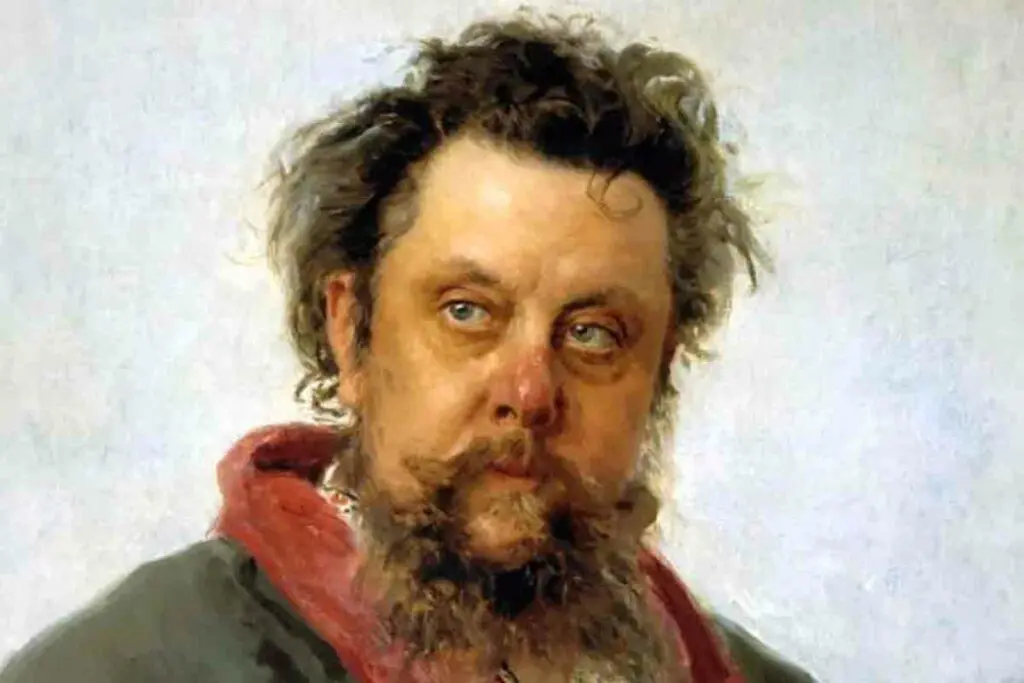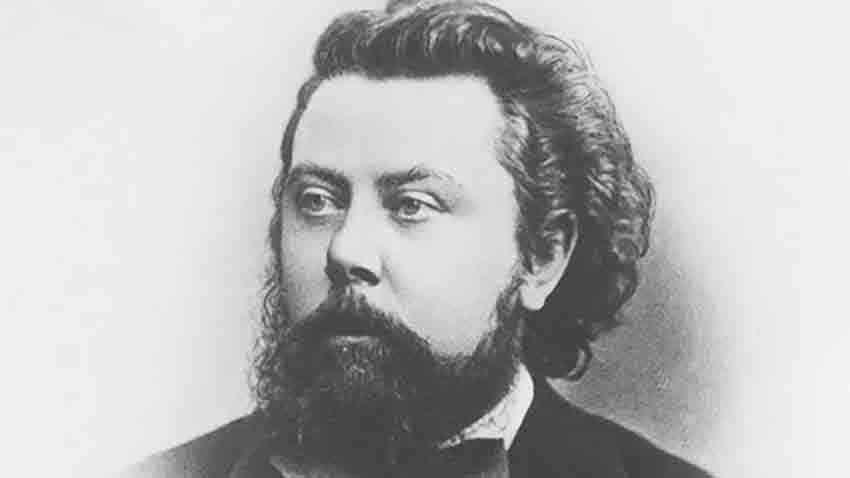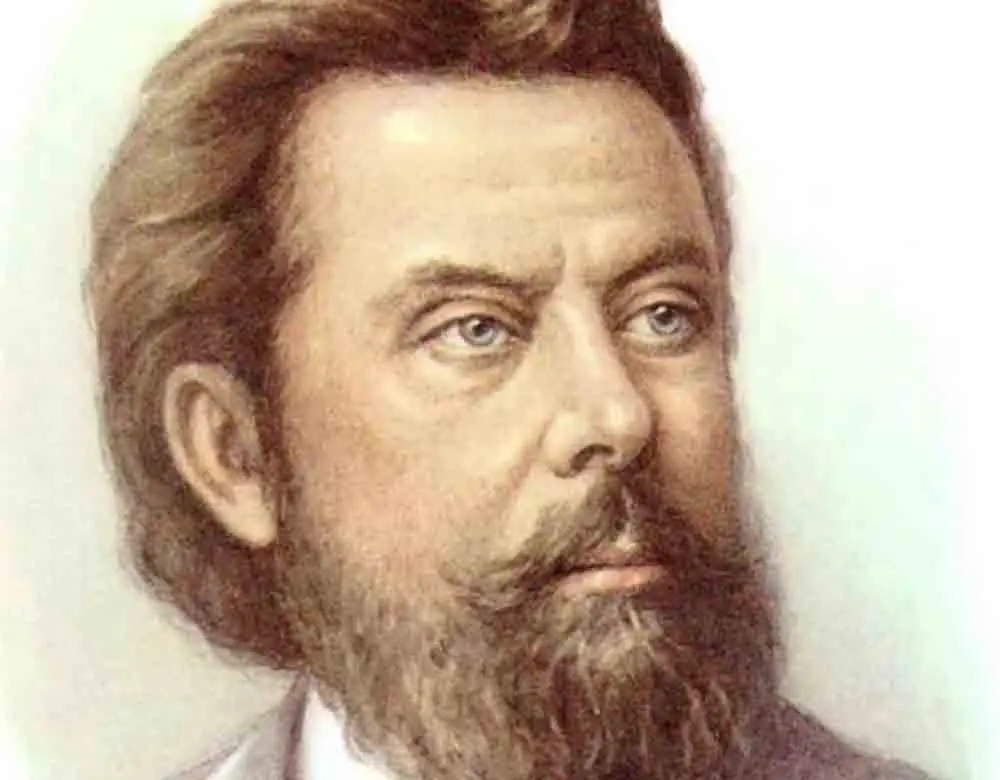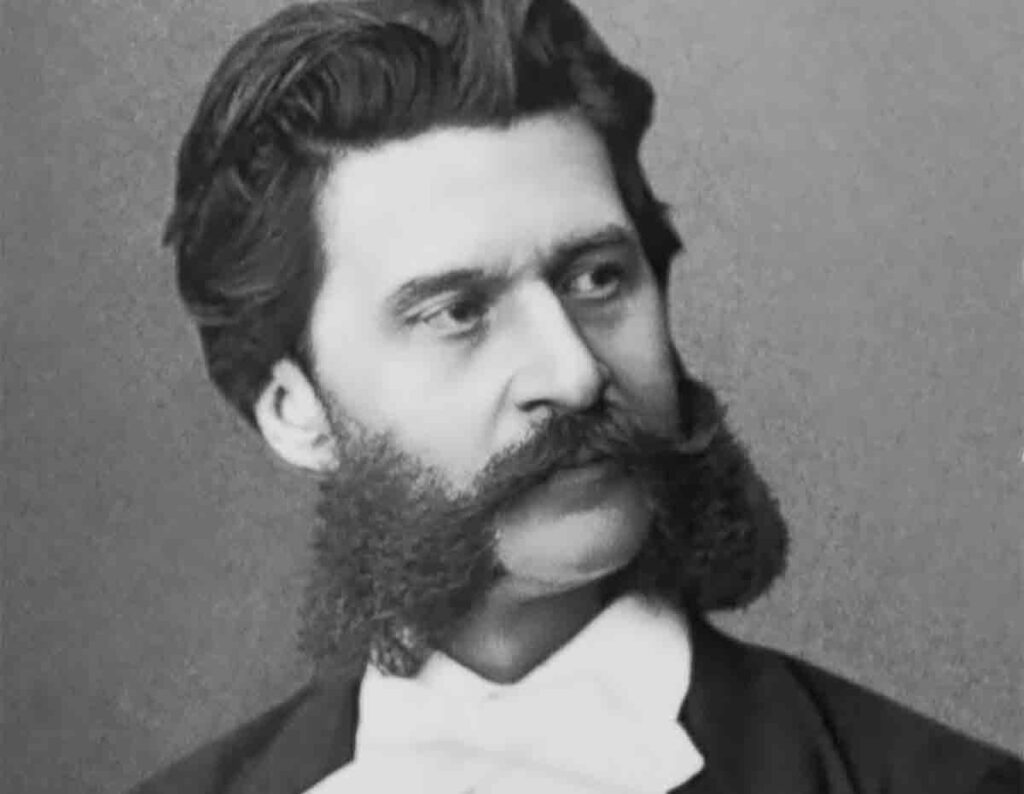Today, the artist Modest Mussorgsky is associated with musical compositions filled with folklore and historical events. The composer deliberately did not succumb to the Western current. Thanks to this, he managed to compose original compositions that were filled with the steel character of the Russian people.

Childhood and youth
It is known that the composer was a hereditary nobleman. Modest was born on March 9, 1839 in the small estate of Karevo. Mussorgsky's family lived very prosperously. His parents owned land, so they could afford a non-poor existence for themselves and their children.
Parents managed to give Modest a carefree and happy childhood. He bathed in the care of his mother, and from his father he received the right life values. Mussorgsky grew up under the care of a nanny. She instilled in the boy a love for music and Russian folk tales. When Modest Petrovich grew up, he remembered this woman more than once.
Music interested him from early childhood. Already at the age of 7, he could pick up a melody by ear, which he heard a few minutes ago. He was also very good at heavy piano pieces. Despite this, the parents did not see either a composer or a musician in their son. For Modest, they wanted a more serious profession.
When the boy was 10 years old, his father sent him to the German school, which was located in St. Petersburg. The father revised his views on his son's hobbies for music, therefore, in the cultural capital of Russia, Modest studied with the musician and teacher Anton Avgustovich Gerke. Soon Mussorgsky presented his first play to his relatives.
The head of the family sincerely rejoiced at the success of his son. Father gave permission to teach musical literacy. But this did not take away from him the desire to raise a real man from his son. Soon Modest entered the school of guards officers. According to the recollections of the man, strictness and discipline reigned in the institution.
Mussorgsky accepted absolutely all the established rules of the school of guards officers. Despite his studies and grueling training, he did not leave music. Thanks to his musical skill, he became the soul of the company. Not a single holiday passed without the game of Modest Petrovich. Alas, often impromptu performances were accompanied by alcoholic beverages. This contributed to the development of alcoholism in the composer.
The creative path of the composer Modest Mussorgsky
After graduating from an educational institution, Modest was sent to the St. Petersburg Preobrazhensky Regiment. It was during this period of time that the musician flourished. He met the Russian elite.

Then Modest often appeared in the house of Alexander Dargomyzhsky. He managed to join the circle of cultural figures. Mily Balakirev advised the composer to leave military service and devote his life to music.
The creative path of the famous maestro began with the composer honing his musical skills. Then he realized that he was thinking much wider than simple instrumental arrangements of symphonic works. The maestro presented several orchestral scherzos, as well as the play Shamil's March. The works were approved by representatives of Russian culture, after which Modest Petrovich thought about creating operas.
For the next three years, he actively worked on a composition based on the tragedy of Sophocles "Oedipus Rex". And then he worked on the plot of the opera "Salambo" by Gustave Flaubert. It is noteworthy that none of the above works of the maestro was ever completed. He quickly lost interest in creations. But, most likely, he did not finish the compositions because of his addiction to alcohol.
Experiments
The early 1960s can be characterized as a time of musical experimentation. Modest Petrovich, who was very fond of poetry, composed music. "Song of the Elder", "Tsar Saul" and "Kalistrat" - these are not all the compositions that have received recognition from Russian cultural figures. These works gave rise to a folk tradition in the work of the maestro. Mussorgsky touched upon social problems in his works. The compositions were filled with drama.
Then came the time for lyrical romances. The following compositions were popular: "Svetik-Savishna", "Song of Yarema" and "Seminarian". The presented works were warmly received by contemporaries. Creativity Modest Petrovich began to be interested far beyond the borders of Russia. In the late 1960s, the presentation of the incredible symphonic composition "Midsummer Night on Bald Mountain" took place.
At that time, he was a member of the Mighty Handful association. Modest absorbed, like a sponge, ideas and trends in music, which were due to the political situation in the country. The maestro understood that the task of cultural figures was to be able to convey the tragedy of those events through the prism of music. Modest managed to convey a dramatic picture of the events that took place in Rus' in the past and in the present.
Composers wanted to bring creativity closer to real events. Thus, they were in search of the so-called "new forms". Soon the maestro presented the composition "Marriage" to the public. Biographers called the presented work of Mussorgsky a "warm-up" before the presentation of the world masterpiece "Boris Godunov".

Modest Mussorgsky: Ease of work
Work on the opera Boris Godunov began in the late 1960s. It was so easy for Modest Petrovich to play parts that already in 1969 he finished work on the opera. It consisted of four acts with a prologue. Another fact is also interesting: when writing the composition, the maestro did not use drafts. He nurtured the idea for a long time and immediately wrote down the work in a clean notebook.
Mussorgsky perfectly revealed the theme of the common man and the people as a whole. When the maestro realized how beautiful the composition turned out, he abandoned solo concerts in favor of choral ones. When they wanted to stage the opera at the Mariinsky Theatre, the directorate refused the maestro, after which Modest had to make some changes to the work.
In a short time the composer worked on the composition. Now the opera has some new characters. The finale, which was a mass folk scene, acquired a special color in the work. The premiere of the opera took place in 1974. The composition was filled with folklore motifs and colorful images. Modest Petrovich after the premiere bathed in the rays of glory.
On the wave of popularity and recognition, the maestro composed another legendary composition. The new work "Khovanshchina" has become no less brilliant. The folk musical drama included five acts and six films based on its own libretto. Modest did not finish work on the musical drama.
Over the next years, the maestro was torn between two works at once. Several factors prevented him from completing the work - he suffered from alcoholism and poverty. In 1879, his comrades organized a tour of Russian cities for him. This helped him not to die in poverty.
Details composer's personal life Modest Moussorgsky
Mussorgsky spent most of his conscious and creative life in St. Petersburg. He was part of the elite. The members of the creative community "The Mighty Handful" were a real family of the musician. With them he shared joy and sorrow.
The maestro had many friends and good acquaintances. He was loved by the fairer sex. But, alas, none of his familiar women did not become his wife.
The musician and composer had a short affair with Lyudmila Shestakova, the sister of Mikhail Glinka. They wrote letters to each other and confessed their love. She didn't marry him. One of the possible reasons for the refusal of legal relations could be Mussorgsky's alcoholism.
Interesting facts about the composer
- He failed to achieve universal recognition during his lifetime. Only in the XNUMXth century the maestro's works were appreciated.
- He sang beautifully and had a magnificent velvety baritone voice.
- Modest Petrovich often left excellent works without bringing them to their logical conclusion.
- The composer wanted to travel, but could not afford it. He was only in the south of Russia.
- He often lived in the houses and apartments of his acquaintances. Because after the death of his father, the composer experienced financial difficulties.
The last years of the life of the famous composer Modest Mussorgsky
In the early 1870s, the famous maestro's health deteriorated. A 40-year-old young man has turned into a frail old man. Mussorgsky had bouts of insanity. All this could have been avoided. But the constant alcoholic revelry did not leave the composer a chance for a normal and healthy life.
The musician's condition was monitored by physician George Carrick. Modest Petrovich specially hired him for himself, since lately he was haunted by the fear of death. George tried to rid Modest of alcohol addiction, but he did not succeed.
The musician's condition worsened after his dismissal from the service. He was reduced to poverty. Against the background of an unstable and emotional state, Modest Petrovich began to drink even more often. He survived several bouts of delirium tremens. Ilya Repin was among those who supported the maestro. He paid for the treatment, even painted a portrait of Mussorgsky.
On March 16, 1881, he again fell into insanity. He died from meth-alcohol psychosis. The composer was buried on the territory of St. Petersburg.



